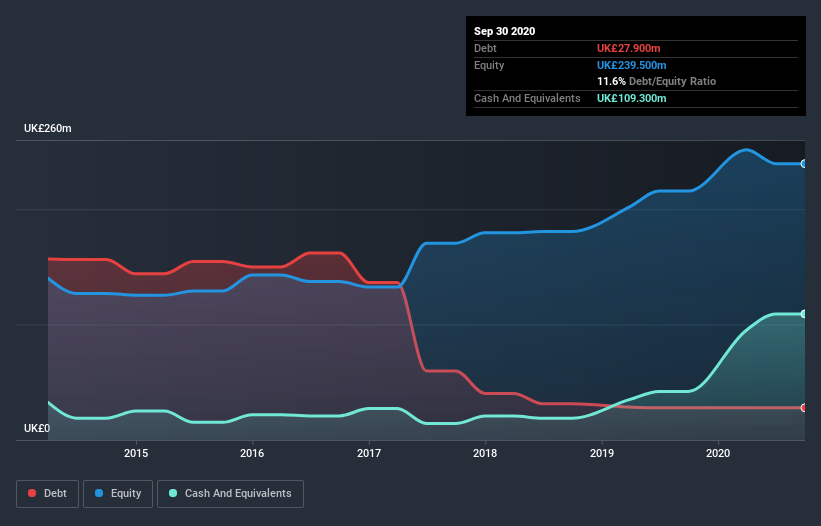Is Oxford Instruments (LON:OXIG) Using Too Much Debt?

David Iben put it well when he said, 'Volatility is not a risk we care about. What we care about is avoiding the permanent loss of capital.' When we think about how risky a company is, we always like to look at its use of debt, since debt overload can lead to ruin. As with many other companies Oxford Instruments plc (LON:OXIG) makes use of debt. But is this debt a concern to shareholders?
What Risk Does Debt Bring?
Debt and other liabilities become risky for a business when it cannot easily fulfill those obligations, either with free cash flow or by raising capital at an attractive price. Ultimately, if the company can't fulfill its legal obligations to repay debt, shareholders could walk away with nothing. However, a more common (but still painful) scenario is that it has to raise new equity capital at a low price, thus permanently diluting shareholders. Of course, plenty of companies use debt to fund growth, without any negative consequences. When we think about a company's use of debt, we first look at cash and debt together.
View our latest analysis for Oxford Instruments
How Much Debt Does Oxford Instruments Carry?
The chart below, which you can click on for greater detail, shows that Oxford Instruments had UK£27.9m in debt in September 2020; about the same as the year before. However, it does have UK£109.3m in cash offsetting this, leading to net cash of UK£81.4m.

How Healthy Is Oxford Instruments' Balance Sheet?
We can see from the most recent balance sheet that Oxford Instruments had liabilities of UK£164.1m falling due within a year, and liabilities of UK£6.90m due beyond that. On the other hand, it had cash of UK£109.3m and UK£68.3m worth of receivables due within a year. So it actually has UK£6.60m more liquid assets than total liabilities.
Having regard to Oxford Instruments' size, it seems that its liquid assets are well balanced with its total liabilities. So it's very unlikely that the UK£1.14b company is short on cash, but still worth keeping an eye on the balance sheet. Simply put, the fact that Oxford Instruments has more cash than debt is arguably a good indication that it can manage its debt safely.
But the bad news is that Oxford Instruments has seen its EBIT plunge 15% in the last twelve months. We think hat kind of performance, if repeated frequently, could well lead to difficulties for the stock. The balance sheet is clearly the area to focus on when you are analysing debt. But it is future earnings, more than anything, that will determine Oxford Instruments's ability to maintain a healthy balance sheet going forward. So if you're focused on the future you can check out this free report showing analyst profit forecasts.
Finally, a company can only pay off debt with cold hard cash, not accounting profits. While Oxford Instruments has net cash on its balance sheet, it's still worth taking a look at its ability to convert earnings before interest and tax (EBIT) to free cash flow, to help us understand how quickly it is building (or eroding) that cash balance. Happily for any shareholders, Oxford Instruments actually produced more free cash flow than EBIT over the last three years. That sort of strong cash conversion gets us as excited as the crowd when the beat drops at a Daft Punk concert.
Summing up
While we empathize with investors who find debt concerning, you should keep in mind that Oxford Instruments has net cash of UK£81.4m, as well as more liquid assets than liabilities. And it impressed us with free cash flow of UK£57m, being 101% of its EBIT. So we are not troubled with Oxford Instruments's debt use. When analysing debt levels, the balance sheet is the obvious place to start. But ultimately, every company can contain risks that exist outside of the balance sheet. Take risks, for example - Oxford Instruments has 1 warning sign we think you should be aware of.
If, after all that, you're more interested in a fast growing company with a rock-solid balance sheet, then check out our list of net cash growth stocks without delay.
If you’re looking to trade Oxford Instruments, open an account with the lowest-cost* platform trusted by professionals, Interactive Brokers. Their clients from over 200 countries and territories trade stocks, options, futures, forex, bonds and funds worldwide from a single integrated account. Promoted
New: AI Stock Screener & Alerts
Our new AI Stock Screener scans the market every day to uncover opportunities.
• Dividend Powerhouses (3%+ Yield)
• Undervalued Small Caps with Insider Buying
• High growth Tech and AI Companies
Or build your own from over 50 metrics.
This article by Simply Wall St is general in nature. It does not constitute a recommendation to buy or sell any stock, and does not take account of your objectives, or your financial situation. We aim to bring you long-term focused analysis driven by fundamental data. Note that our analysis may not factor in the latest price-sensitive company announcements or qualitative material. Simply Wall St has no position in any stocks mentioned.
*Interactive Brokers Rated Lowest Cost Broker by StockBrokers.com Annual Online Review 2020
Have feedback on this article? Concerned about the content? Get in touch with us directly. Alternatively, email editorial-team (at) simplywallst.com.
About LSE:OXIG
Oxford Instruments
Oxford Instruments plc provide scientific technology products and services for academic and commercial organizations worldwide.
Flawless balance sheet and good value.


